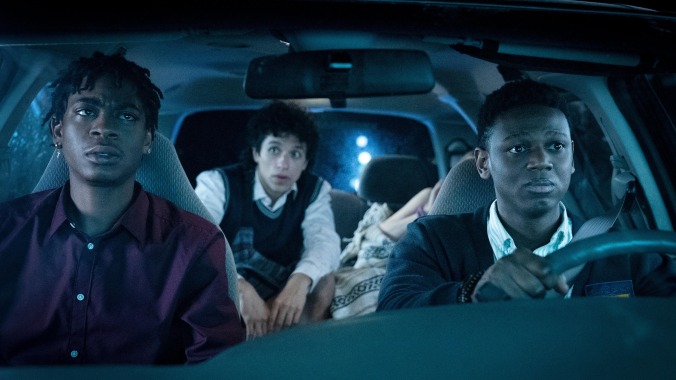Emergency urgently mixes college comedy and social commentary
Strong performances from RJ Cyler and Donald Elise Watkins bolster this story of two Black students trying to do the right thing

No good deed goes unpunished in Emergency, a shrewd social satire that uses the “one crazy night” comedy trope as a Trojan horse to tell a story of racial anxiety and white privilege. Ostensibly about two Black college students who argue over what to do when they find a white girl passed out in their living room, Emergency is really an astute and timely conversation between two characters who represent different sides of the Black experience in America. It’s a cautionary tale of Black anxiety told with stealth, laughs, and just enough feeling, where every decision—even the right ones—must pass through a filter of racial assumptions. While there are moments when Emergency could have benefitted from tighter dialogue scenes and a quicker pace, director Carey Williams (recovering nicely from his first film, the Shakespeare experiment R#J) deftly fires off a lot of rhetorical arrows, and when they hit their target, the comedy really stings.
Williams and screenwriter K.D. Dávila have much on their minds, but wisely prioritize the story’s central relationship, allowing its topical themes to emerge naturally from two well-drawn characters. Emergency eases us in by first introducing opposites-attract best friends Kunle (Donald Elise Watkins) and Sean (RJ Cyler), students at the fictional and predominantly white Buchanan University. Kunle is the more sensitive and serious-minded of the two; the son of high-achieving Nigerian doctors, he’s Princeton-bound for postgrad studies, but still pays close attention to his live culture experiment in the university’s biology lab. The fast-talking Sean, with his ever-present vape pen, seems on the road to nowhere and is more interested in partying and getting laid, two distinct possibilities given the evening’s entertainment: an epic run of seven frat parties in one night called the Legendary Tour. If they manage to hit all seven ragers, they’ll be the first Black students at Buchanan to do so.
One of the film’s canniest choices is making Kunle the son of immigrants. Kunle’s family lineage and wealth suggests he’s less likely to view his American experience primarily through a racial lens. This makes him the opposite of Sean, the realist who knows exactly how things work around here. Early on, the pair are the only Black students at a lecture where the white professor discusses, and repeatedly utters, the N-word. By using such a third-rail epithet, Williams is not just putting the viewer on alert, he’s showing us how Kunle and Sean view the world. Kunle rationalizes the professor’s use of the N-word as part of a valid academic discussion, while Sean is incensed. (Then there’s the white student who offers to “start a movement or something”) Their opposing viewpoints come into conflict when they return home to prepare for their big night, only to find a white girl (Maddie Nichols) unconscious on their floor.
Kunle initially wants to call 911, which Sean vetoes, keenly aware of what the cops will think when they see two Black men with an unconscious white girl. Sean’s reluctance is backed by a third roommate, the sweet, reserved, Latino gamer Carlos (a very funny Sebastian Chacon). After initially suggesting they find a white person to call 911 for them, he agrees that driving the girl to the hospital is the course of action least likely to get them arrested or shot by police. When a sobriety checkpoint scuttles that plan, the bad decisions start piling up.
It’s easy to imagine Williams taking this story and crafting either a boisterously funny, obstacle-filled mad dash to the hospital or an indignant, op-ed baiting thesis on post-George Floyd America. Instead, he turns down the heat and blends the two, creating a buddy comedy of errors shot through with an ever-darkening undercurrent of racial commentary. It’s about three party-hearty Black and Brown college students who want to do the right thing while knowing full well that some will see bad intentions even in their best intentions. And we’re not just talking the police. On the hunt for the missing girl is her sister, Maddy (Sabrina Carpenter), who looks like she was recruited from the garden party in Jordan Peele’s more brazenly provocative Get Out. Representing the “racially profile first, ask questions later” white perspective, Maddy’s irresponsible behavior echoes that of the neighbors with the BLM lawn sign who accuse Kunle, Sean, and Carlos of selling drugs.
Watkins (The Underground Railroad) and Cyler (The Harder They Fall, Me And Earl And the Dying Girl) are both terrific and have great chemistry. Aside from being a wonderfully full-bodied and oftentimes bold depiction of Black friendship, Emergency is the story of Kunle’s awakening, and Watkins adroitly navigates both ends of the character’s journey. Starting off as a bookish, naïve young man who notes the statistical improbability of them getting shot by police, he’ll come to realize that his Princeton-level intelligence may not stop others from reflexively thinking the worst of him. Cyler has the showier role as a streetwise screwup who sums up his thoughts on the evening with, “If we get pulled over, we die; we call the police, we die; we breathe the wrong way, we die.” But even if Sean has less emotional road to travel, Cyler ably moves beyond mere wisecrackery to convey Sean’s insecurities about his future.
Emergency, which premiered earlier this year at the Sundance Film Festival, is based on Williams and Dávila’s 2018 short of the same name, and they may have tried too hard to expand it to feature length. The 105-minute version would have benefitted from shorter and punchier exchanges between the central bickering trio, and the accumulation of incidents and bad decisions gets wearying. But Kunle and Sean make for a very engaging duo and one can imagine enjoying them in any manner of comedy. This kind of comedy, unfortunately, is the right one for this moment.